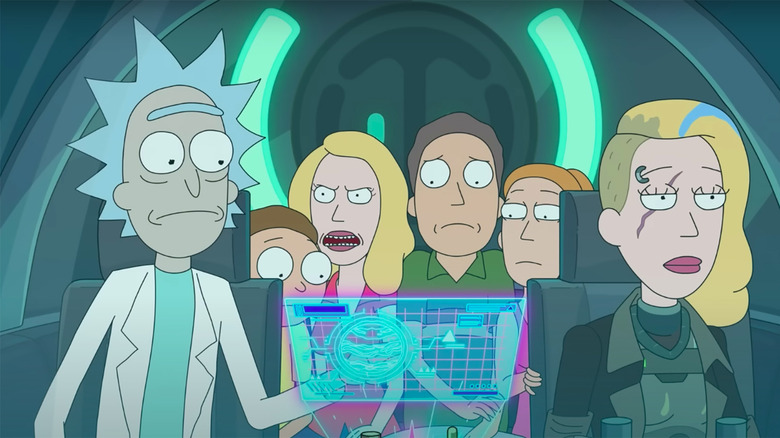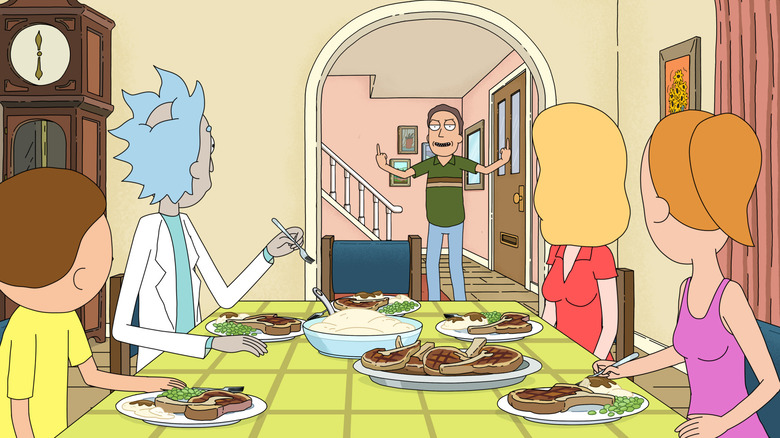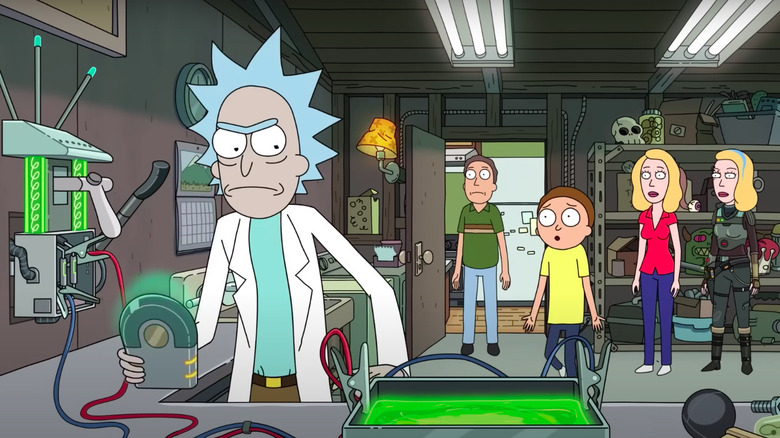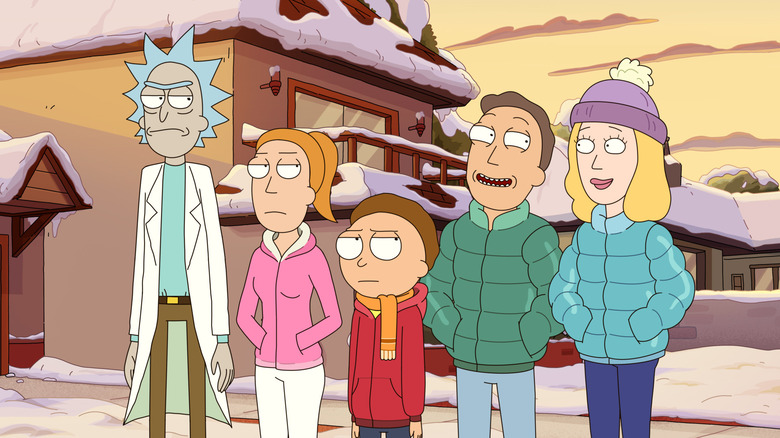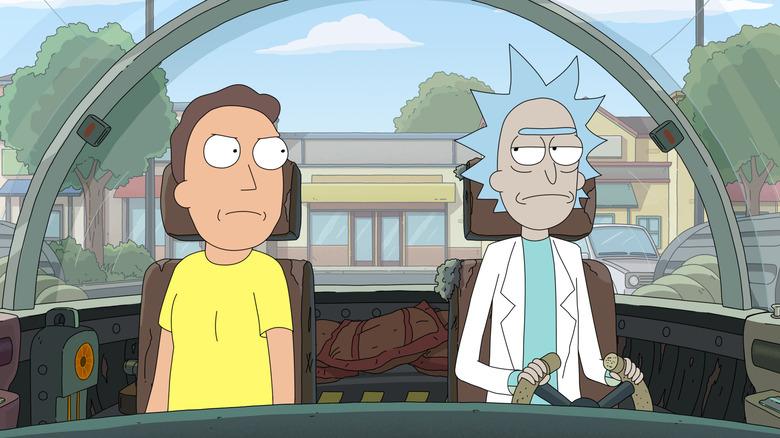Rick And Morty's Chris Parnell And Sarah Chalke On The Evolution Of Jerry And Beth, Voice Acting Challenges & More [Interview]
"Rick and Morty" is returning for its sixth season on September 4, 2022. The Adult Swim animated series has turned into a multiverse-sprawling laugh riot, becoming such a pillar of pop culture that fans created a bit of chaos by demanding that McDonald's bring back a certain condiment (twice). The series is squarely focused on the titular duo of grandfather Rick Sanchez and his timid grandson Morty as they go on a series of cosmic misadventures filled with hilarity, vulgarity, and endless sci-fi insanity. But the roles of Rick's daughter, Beth, and her hapless husband, Jerry, have become more integral to the show than ever, especially in the wake of its ever-growing multiversal shenanigans.
Leading up to the sixth season premiere of "Rick and Morty," we spoke with Sarah Chalke and Chris Parnell, the respective voices of Beth and Jerry, as well as all their multiverse variants. We talked about the evolution of their characters over the years, the challenges of voice acting, and whether or not they have a creative hand in the trajectory of their characters.
This interview was conducted in a virtual roundtable with two other outlets, and it has been lightly edited for clarity.
'I was so pumped that it wasn't just a one-off for one episode that we saw Space Beth'
For both of you, what creative itch does doing voice work for animation scratch for you that live-action doesn't?
Parnell: Well, it's incredibly freeing to just have to worry about what's happening with your voice, I find. I don't have to worry about blocking, or this, or that. I usually gesture quite a lot, like I am now, in the booth. It's a challenge, because you're not looking at anybody. You're looking at the lines, and you might have a back and forth with the director of the episode, so it feels more like you're doing a scene and you can connect that way. But I don't know, it's just fun. It takes a lot less time. You can do it a lot of different ways without taking up much time. I just find it, I guess, freeing in a way that on-camera stuff isn't, but obviously I love doing the on-camera, too, when it comes along.
Chalke: Yeah. I love the experience of how different they both are, too. In terms of a creative itch, I completely agree with Chris. It's so creatively freeing, because you have your script, and you're going through it one line at a time, so there's the added challenge, that's kind of unique and interesting, of not getting to interact with someone else. But you can take a look at it and say, "Okay, I want to try this. I want to try that." The director throws you some ideas. You can take one line, and you can try it literally 20 different ways in two minutes. So there's really no constraints. Normally, you're recording in a studio with a big glass wall, and you can see whoever's directing you, whether in the early days when it was Dan [Harmon] and Justin [Roiland], or now it's Scott [Marder], and you can have that back and forth. Now you're in a vocal booth, and so I miss that piece of it. At the same time, there's something that's even more freeing about the fact that you're just — because I'm like Chris, I gesticulate a lot. You're just completely in your own little world.
Parnell: It also doesn't matter what you look like. You can play a character, even though Jerry doesn't look that crazily different from me, but that's another freeing aspect of animation.
Jerry and Beth have experienced some wild evolution over the series, especially with the multiverse aspect being brought into the equation. How exciting and refreshing is it to get to play these different versions of the characters? Sarah, you've got Space Beth, and Chris, Jerry has a very interesting version of himself in the season 6 premiere.
Parnell: Yeah, whenever Jerry gets to go to a darker place, or more emotional place, it's always gratifying and fun to be able to go there and try to do justice to the material. Then when they went to the therapy planet and got to see Jerry as a worm as Beth envisioned him, it's just fun. It's great. Sometimes it's a little more challenging, but it's very satisfying to be able to play so many different aspects of the character.
Chalke: For me, with Space Beth, I was so pumped that it wasn't just a one-off for one episode that we saw Space Beth, that it was a situation that got to recur, and it's a very different experience recording Space Beth. Obviously, they're so different, and so in an episode, we'll record all of Home Beth, and then we'll do all of Space Beth right afterwards, so that they're completely separate. I think there's such a different swagger and confidence to Space Beth, and a different texture to her voice. So it's been a fun challenge to try and play two different characters that are also linked and yet one and the same.
'I actually think season 6 is personally one of my favorite seasons that we've recorded'
With the mix of irreverence and deep mythology "Rick and Morty" offers, there's a lot of opportunity for you guys to change, tweak, and play with the characters. Are there any ideas that you have that excite you as actors that you've wanted to explore for your characters, or even anything in the pipeline that you're really excited for people to experience?
Chalke: In terms of excited what's coming down the pipeline, I actually think season 6 is personally one of my favorite seasons that we've recorded. We haven't gotten to see any of them yet. Obviously, it's a very different experience when you get to watch it, versus what you visualize when you read about the different alien beings, and what you picture in your own mind, and then what the incredibly talented animators do with it. But in terms of having been asked to do specific things, no, there's nothing I would come up with that would be better than what Dan and Justin and the writers' room are coming up with.
We haven't really made any particular suggestions along the way, but when you get an episode in your inbox, it's so exciting to read it and to see what's coming. There are so many times this season where I was like, "Oh, I can't wait to do that. That's kind of cool, and different, and unique, and something we haven't done yet," which is what continually blows my mind about the show; they keep coming up with things that have not been done on the show or have not been done, period.
Parnell: We don't typically know much, if anything, about what's coming down the pipeline, unless Scott or somebody happens to mention in the session, "Oh yeah, we got this happening with Jerry coming up," but that's pretty rare. The show, getting to play so many different emotions and just aspects of Jerry, like any acting gig, it's exciting. It's rewarding. I find that very satisfying, especially when Jerry goes to the darkest places, and getting to try to live in that space.
'They put so much energy and time into the scripts that they're pretty magnificently crafted by the time we get them'
When you get that script in the email, as you start looking at it, how much work does it take to make the lines your own, so to speak, whether that's verbatim, or whether that's slightly tweaking. How much ad-libbing do you guys get a chance to do?
Parnell: In terms of the ad-libbing, there's a tiny amount of freedom there, if something makes sense to you to say it a little bit differently. Sometimes maybe a word change. They put so much energy and time into the scripts that they're pretty magnificently crafted by the time we get them, but they're not such sticklers about it that you can't adjust it a little bit. I'm sorry. What was the first part of your question? I forgot. Sorry.
How much work goes into making it sound like you would make it sound as a character? How much does that deviate from what's written?
Parnell: Almost not at all. Virtually not at all, because they know the character very well. So it's not like, "Oh, how would Jerry say that?" The only difference is if it's a scenario that Jerry hasn't been in before, then you're like, "Huh, okay. How does Jerry find this place?" But they've written it so well that it's there on the page. It's not too much searching that you have to do. At least for me.
Chalke: For me, too. I think that in terms of the ad-libbing, very, very little. I think that probably is different for Justin, because obviously he's one of the co-creators of the show and one of the writers on the show. So for him, I think sometimes he'll go into the booth, and we've heard stories of him doing Rick, and I wish we could be a fly on the wall. We used to get to do it at Comic-Con when Dan and Justin would improv a scenario, and Dan would yell out situations, and Justin would be sketching it on one of those iPads that throws the image up onto the screen. So not only was he improv-ing, but he is also drawing in real time, and it was so cool to get to witness and to watch. I know that's been Justin in the booth recording Rick as well.
I think the story is, and I could be getting this wrong, but for "Get Schwifty," for example, which is quite an awesome song, I think Justin was improv-ing some songs and laying down tracks for Summer's MP3 player in the video game, and then that song, "Get Schwifty," ended up being the seed for that episode. So it's always interesting to hear how those things come about. But yeah, by the time that we get the scripts, they're such perfectionists in the writers' room, and it's so specifically crafted, and often we'll have to come back and record a few different lines from an episode that have been tweaked. The show moves at such a quick pace, and so every word is chosen so carefully.
'So much of acting is reacting, and you are not able to do that'
What's one of the more challenging aspects about this kind of voice work that people might not think about? Maybe something that you guys learned as you started coming in to do voice work. Obviously, Chris, you've been doing this voice work for a long time since before "Rick and Morty," and Sarah, you have your fair share of experience as well. But I think a lot of people don't understand maybe certain challenges that come with this kind of gig. It's not just as simple as reading your lines in a recording booth. There's more to it than that.
Chalke: For sure. Not interacting with the other person in the scene, because so much of acting is reacting, and you are not able to do that, because you're not reading with someone else. So you're kind of taking it line-by-line, and I would say that was the biggest mind shift.
Parnell: Yeah, you have to sort of imagine in your mind in a way, what the other person is saying, how they're saying it. Whenever possible, I do try to do a back and forth with Scott or whoever's directing it. It doesn't make sense, necessarily, for a lot of the scenes, but for me, it's the challenge of not just doing different musical versions of the line. I can say it this way. I can say it this way. I can say it this way. But remembering to try to be in that moment there with Jerry, and connect to the other character that, like Sarah said, you can't see. It's just creating it all in your mind, and trying to be really there, because it'll probably be fine if I just do it different ways. I've got good instincts, but the more that you can connect to the material as an actor, you'll find more, and it'll have more life to it.
The sixth season of "Rick and Morty" premieres at 11:00pm ET/PT on September 4, 2022 on Cartoon Network's Adult Swim.
